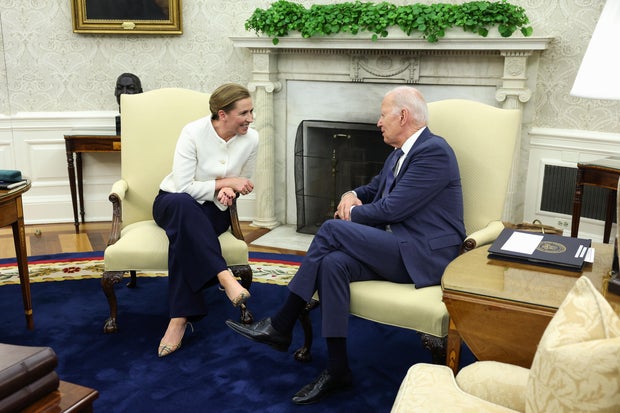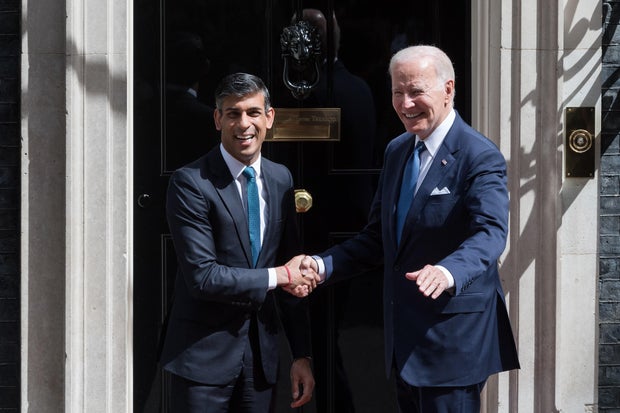London — When President Biden realized he wouldn’t be able to sit down with one of Europe’s youngest leaders at last year’s NATO summit in Madrid, he didn’t send an email or a text. He reached for a pen.
He personally wrote a note to Danish Prime Minister Mette Frederiksen, which translated into an invitation to the White House in early June for the 45-year-old leader. The Oval Office meeting lasted more than two hours — much longer than expected — and the prime minister was given the Biden family seal of approval by his granddaughters, who had met with Frederiksen briefly a year ago at the NATO summit in Madrid.
Kevin Dietsch / Getty Images
“My granddaughters, who are bright young women, who are college and law school graduates … still talk to me about their meeting with the prime minister,” Mr. Biden said.
While the draw of the American presidency transcends administrations for many world leaders, Mr. Biden’s mix of old-school politicking and familial flair with his counterparts forms the backbone of his foreign policy in a way that is unique among recent U.S. leaders. Diplomats and foreign policy experts suggest this personal and nostalgic approach is not only distinctive but also strategic, enhancing U.S. credibility and moral authority, especially in the wake of the Trump administration.
“For Europe, he represents a nostalgia for the 20th century, which was based on shared values, when the West was strong and the relations were clear with the Cold War,” said Liana Fix, European fellow at the Council on Foreign Relations. “President Biden is the old, great trans-Atlanticist.”
Honed over decades in the Senate and eight years as vice president, the president’s personal appeal has emerged as one of his strongest assets on the world stage, allowing him to smooth ruffled feathers and lead a coalition of allies that has managed to remain remarkably united in its response to the Russian invasion of Ukraine.
Experts said this approach will be put to the test once again this week with Mr. Biden in Lithuania for a high-stakes summit of NATO allies, where the divisive issue of Ukraine’s potential admission into the alliance is top of mind.
The president’s interactions with other world leaders — either in the Oval Office or in European capitals — also offer him the opportunity to highlight his foreign policy experience at a time when many Americans are skeptical that the 80-year-old president has what it takes to serve another term. Recent CBS News polling found that his age was the most cited reason why some Democrats and independents said they didn’t think Mr. Biden should run for reelection.
Wiktor Szymanowicz/Future Publishing via Getty Images
While his age may be a liability at home, several diplomats who have been in meetings with Mr. Biden in some of the nearly two dozen countries he has visited as president said his age was not a factor in their negotiations.
“He spares his time, but he is focused on the meeting at hand and the topics,” one European official said, speaking on condition of anonymity to describe sensitive conversations. “We see that he is managing the effort of being 80 years old versus 30, but we tend to be more impressed than anything.”
For his part, the president seems to be leaning into the commentary on his age. “I know I look like I am still only 29, but I’ve been around a long time,” Mr. Biden recently told diplomats at the White House. “As one of my friends said, try to connect age and wisdom.”
Analysts said Mr. Biden, who is the ninth oldest leader in the world according to the Pew Research Center, has been able to bridge age gaps with his counterparts and bond with much younger world leaders, many of whom are in their 40s and were born after his own two sons.
Dan Baer, senior vice president for policy research and director of the Europe Program at the Carnegie Endowment for International Peace, said that Mr. Biden “has figured out how to relate to people who are the age of his kids in a way that is respectful, and I think that earns their respect from an intergenerational perspective because he has seen a lot, he’s been around and he doesn’t mince words or fake it.”
“He cannot change that he is 80 years old, and so he presents himself as he does, and people find in that something that they can trust,” Baer added.
His embrace of Ukrainian President Volodymyr Zelenskyy, 45, is perhaps the most salient example of his ability to connect with a younger leader. Since the run-up to Russia’s invasion in February 2022, Mr. Biden has thrown the weight of a superpower behind the Ukrainian president, bolstering his war effort with billions of dollars in aid and firepower. The president will be meeting with Zelenskyy on Wednesday, the last day of the NATO summit.
While the U.S. would have an interest in supporting Ukraine regardless of its leader, the relationship between the two countries has been strengthened by the personal bond between Zelenskyy and Mr. Biden, punctuated by high-profile one-on-one interactions. Late last year, Zelenskyy left Ukraine for the first time since the war began to visit the White House. Two months later, Mr. Biden visited Zelenskyy in Kyiv in a trip that was cloaked in secrecy.
“You really saw that Biden was putting his arm around Zelenskyy, encouraging him to continue to lead as if suggesting, ‘I got your back,'” Fix said. “It’s a grandfatherly appeal, and the warmth and wisdom from his age seems to transfer.”
Whether it’s a part of his playbook or purely his personality, Mr. Biden has played up the personal in meetings with other world leaders as well, often deviating from strictly business.
When Uruguay’s President Luis Lacalle Pou, 49, made his first visit to the White House recently, the publicly unannounced meeting turned into an hour-and-a-half get-together, complete with a movie recommendation from Mr. Biden — Netflix’s “The Two Popes,” a nod to the two leaders’ shared Catholicism — and an impromptu game of catch with a rugby ball in the Oval Office, according to a person in the room.
After huddling in San Diego in March with British Prime Minister Rishi Sunak, 43, Mr. Biden poked fun at the prime minister’s American education, former Green Card status and Santa Monica home, connections which have earned Sunak criticism back home in the U.K.
“First of all, I want to welcome him back to California. He’s a Stanford man, and still has a home here in California. That’s why I’m being very nice to him, maybe he’ll invite me to his home here in California,” Mr. Biden quipped.
Instead of Santa Barbara, Sunak invited the president on Monday to 10 Downing Street in London for their sixth meeting since Sunak took office last October. Mr. Biden said the relationship is “rock solid,” joking how the two have “only been meeting once a month.”
“We’re very privileged and fortunate to have you here,” Sunak added.
Mr. Biden’s diplomatic style with some world leaders can come through in their body language after several meetings, notably with French President Emanual Macron, age 45. The two have been photographed arm in arm from Spain to Japan to Germany, where cameras once captured Macron hurrying down a walkway, shouting “Joe! Mr. President!” to stop and chat.
Administration officials say this closeness can help smooth tensions when they arise, as they did in 2021, when France felt stung by Australia’s decision to end a $66 billion submarine contract and instead arranged a deal for the vessels from the U.S. and the U.K. Meeting in Rome a month later, Mr. Biden admitted the rollout of the deal was “clumsy” and “not done with a lot of grace.”
Aides said the mea culpa allowed the pair to move forward, with Mr. Biden inviting Macron to the White House for the first state visit of his presidency last December. Asked why he chose Macron, Mr. Biden replied: “Because he’s my friend!”
Fix, of the Council on Foreign Relations, said these relationships with allied leaders have delivered measurable outcomes, citing tougher stances imposed by some European nations toward China and the sustained rallying effort to support Ukraine.
However, the ability of Mr. Biden to connect with other world leaders has not always overcome larger geopolitical dynamics. The president often credits his almost 70 hours spent with China’s President Xi Jinping as the reason he is able to understand the foreign leader, yet relations between the two countries remain chilly.
Until any thaw between the two countries, there will be leaders watching Mr. Biden’s every move.
“At a time where China poses that particular challenge that it does, I think we’re lucky to have President Biden’s perspective on President Xi,” Prime Minister Sunak told CNN last month. “I found that particularly valuable to me as someone who is newer to this.”
Ed O’Keefe contributed to this report.


